|
|
|
Sort Order |
|
|
|
Items / Page
|
|
|
|
|
|
|
| Srl | Item |
| 1 |
ID:
115858
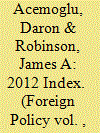

|
|
|
| 2 |
ID:
104666
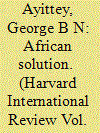

|
|
|
| 3 |
ID:
107149
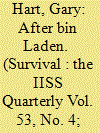

|
|
|
|
|
| Publication |
2011.
|
| Summary/Abstract |
The Cold War ended 20 years ago. NATO has yet to define a twenty-first- century mission. New allies and new rivals are emerging. There are new security threats that do not lend themselves to military response and that cannot be addressed either by old alliances or by the United States alone, and the nature of warfare and the character of conflict themselves are changing. The United States' national predisposition, however, has been to rely on traditional institutions and policies and to use them to address unfolding history on its own timetable.
|
|
|
|
|
|
|
|
|
|
|
|
|
|
|
|
| 4 |
ID:
082465
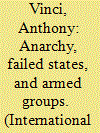

|
|
|
|
|
| Publication |
2008.
|
| Summary/Abstract |
Systemic theories of international politics divide the world into anarchic and hierarchic systems. Conventionally, the boundary of each system is based on juridically defined territorial borders. This article argues that within collapsed and "fragmented" states there exist autonomous armed groups, which make these states by definition anarchic systems. Unlike earlier accounts of such "domestic anarchy," this article argues that the domestic anarchy is "open" or connected to the international anarchic system. By taking this approach, it is possible to integrate the theoretical understanding of the relations between armed groups and (external) states. Specifically, the article illustrates how there can be "mixed security dilemmas" between states and armed groups, and that other theoretical concepts usually reserved for describing interstate relations can potentially be used to describe state-armed group relations
|
|
|
|
|
|
|
|
|
|
|
|
|
|
|
|
| 5 |
ID:
115863
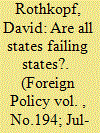

|
|
|
| 6 |
ID:
105951
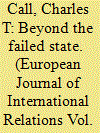

|
|
|
|
|
| Publication |
2011.
|
| Summary/Abstract |
The article advances conceptual alternatives to the 'failed state.' It provides reasons why the concept is deficient, showing especially how counterproductive it is to aggregate states as diverse as Colombia, Malawi, Somalia, Iraq, Haiti, and Tajikistan. I argue for distinguishing among capacity gaps, security gaps, and legitimacy gaps that states experience. Importantly, I show that these gaps often do not coincide in a given country, and that the logical responses to each of the three gaps diverge in significant ways. I offer brief case examples of the logic of response to the gaps and of the tensions that must be managed among them. The article advances the debate over an important and under-theorized emergent concept in global politics.
|
|
|
|
|
|
|
|
|
|
|
|
|
|
|
|
| 7 |
ID:
105085
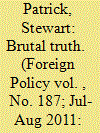

|
|
|
|
|
| Publication |
2011.
|
| Summary/Abstract |
The last 20 years -- so blandly labeled the "post-Cold War era" -- might as well be known as the "Age of Failed States." After decades of confronting Soviet power, successive U.S. administrations suddenly became embroiled in and bedeviled by the world's most dysfunctional countries. Although great-power competition persists, it is often the world's basket cases -- from Somalia to Afghanistan, Haiti to Liberia, and Pakistan to Yemen -- that dominate the U.S. foreign-policy agenda. This trend began in the early 1990s, when a shocking outbreak of state collapse and internal violence, including but by no means limited to episodes of genocide in the former Yugoslavia and Rwanda, seemed to herald a "new world disorder," in the words of British diplomat David Hannay.
|
|
|
|
|
|
|
|
|
|
|
|
|
|
|
|
| 8 |
ID:
120970


|
|
|
| 9 |
ID:
114759
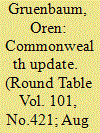

|
|
|
|
|
| Publication |
2012.
|
| Summary/Abstract |
The annual Failed States Index features several leading nations of the Commonwealth, including Nigeria, Uganda, Kenya and, of greatest concern, Pakistan. A death threat against a journalist by Sri Lanka's defence minister reveals that the government appears intent on cowing the press at home and ignoring criticism from abroad, with ominous implications for the country. An unseemly public row between members of Nelson Mandela's family has parallels with a power struggle within South Africa's ruling African National Congress.
|
|
|
|
|
|
|
|
|
|
|
|
|
|
|
|
| 10 |
ID:
107666


|
|
|
|
|
| Publication |
2011.
|
| Summary/Abstract |
In this article the authors examine two set of issues that constrain contemporary peace support operations (PSOs): one centered on the kinds of knowledge prevalent in PSOs and the second involving the organizational structures that characterize them. The authors' aim is to show the deep discursive and structural limitations and contradictions that continue to characterize the actions of armed forces and the dominance of militaristic thinking within PSOs. This article centers on multidimensional peacekeeping marked by emphasizing two main points in regard to the complex nature of such peacekeeping. First, Western military thinking is still dominant in the professional discourse of peacekeeping despite the fact that in many cases it is less relevant to the arenas where it is applied (in weakened or failed states). Second, forces in second-generation peacekeeping missions are by definition a form of hybrid organizations, and therefore conceptual changes in regard to PSOs not only involve the realm of knowledge but also entail practical consequences for the very organizational means used to achieve their aims. The authors' analysis demonstrates the blending, hybridization, and linkages that are an essential part of PSOs as processes that carry both advantages and disadvantages for organizational action.
|
|
|
|
|
|
|
|
|
|
|
|
|
|
|
|
| 11 |
ID:
182833
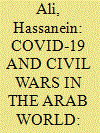

|
|
|
|
|
| Summary/Abstract |
The post-Arab Spring period witnessed the outbreak of devastating civil wars in Syria, Libya and Yemen. These wars had many disastrous impacts on these countries, which threatened their existence as political entities. The Covid-19 pandemic exacerbated the problems facing these countries, especially in light of the collapse of their infrastructure and health care systems. In spite of this, the pandemic and its consequences did not mitigate these civil wars. In this context, this article aims to answer the following question: Why do civil wars continue in the Arab world, despite the Covid-19 pandemic and its disastrous consequences? In other words, why didn't the pandemic create a new dynamic that pushes for the settlement of the civil wars in Syria, Libya and Yemen?
The article provides five reasons to explain this phenomenon. First, the worsening situation in Syria, Libya, and Yemen before the emergence of the Covid-19 pandemic, due to civil wars in these countries turning into protracted conflicts. Second, the nature of the civil wars as proxy wars, due to the large number of regional and international actors that have been involved in each of them. Third, the expansion of war economies in these countries; this phenomenon feeds civil conflict and sustains it. Fourth, the disintegration of the nation state in Syria, Libya, and Yemen, due to the absence of a strong central government, and the multiplicity of actors that control the state's territory. Fifth, the inefficiency of the means to peacefully settle Arab civil wars, mainly through the political efforts of the United Nations.
|
|
|
|
|
|
|
|
|
|
|
|
|
|
|
|
| 12 |
ID:
138076
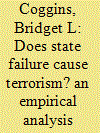

|
|
|
|
|
| Summary/Abstract |
A developed-world consensus ties state failure to new and serious international insecurity. But that conclusion rests upon an uncertain foundation; insights into the nature and intensity of failure-related threats remain tentative and unsystematic. This study begins to remedy the problem, examining the broad relationships between weakness, failure, and terrorism with panel data for 153 countries (1999–2008). I argue that the quantitative literature too often disregards the political context determining terrorism’s use, that terrorism is endogenous to many measures of state failure, and that estimates of the failure-related threat of terrorism are overstated. Consistent with these expectations, I find that most failing and failed states are not predisposed to terrorism. However, among the ‘‘most failed’’ states, those at war or experiencing political collapse are significantly more likely to experience and produce terror. These results refine the relationship between failure and external threat and highlight the importance of terrorism’s macro-level political context.
|
|
|
|
|
|
|
|
|
|
|
|
|
|
|
|
| 13 |
ID:
132992
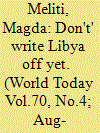

|
|
|
|
|
| Publication |
2014.
|
| Summary/Abstract |
Libya is a country that, despite its frequent stumbles, again and again has got back up on its feet
|
|
|
|
|
|
|
|
|
|
|
|
|
|
|
|
| 14 |
ID:
138238
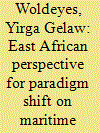

|
|
|
|
|
| Summary/Abstract |
This paper advances the view that the meaning of maritime security should be considered based on lessons of history and requirements of human well-being. It challenges the tendency to separately view maritime security from the political, economic and social structures of the East African littoral states. Based on a critical reading of the history of the development of violent colonial structures in the region, the paper shows that most security discourses in relation to East Africa advance a paradigm that legitimises the control and management of the region’s maritime domain under the surveillance of foreign powers. The framing of poverty and conflicts as internally caused and economically motivated power struggles within fragile states contributes to this paradigm. This paper argues that the East African maritime domain is an integral part of the hinterland, and maritime security should be understood from a perspective that addresses structural violence in the region.
|
|
|
|
|
|
|
|
|
|
|
|
|
|
|
|
| 15 |
ID:
120973


|
|
|
| 16 |
ID:
120969
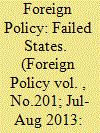

|
|
|
| 17 |
ID:
105040
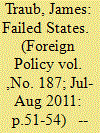

|
|
|
|
|
| Publication |
2011.
|
| Summary/Abstract |
Only some of them. It has been a truism of U.S. foreign policy since the 9/11 terrorist attacks that the United States is, in the words of President George W. Bush's 2002 National Security Strategy, "threatened less by conquering states than we are by failing ones." Defense Secretary Robert Gates has said that over the next 20 years, the gravest threats to America will come from failing states "that cannot meet the basic needs -- much less the aspirations -- of their people." Both as candidate and as president, Barack Obama has repeated this claim and has sought to reorient policy toward the prevention of state failure.
|
|
|
|
|
|
|
|
|
|
|
|
|
|
|
|
| 18 |
ID:
092480
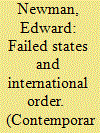

|
|
|
|
|
| Publication |
2009.
|
| Summary/Abstract |
What is meant by failed states in debates about international order, security and threats to security? Does the concept of failed states, as constructed through academic and policy discourse, undermine the ontological assumptions of international order premised upon bounded, viable, rational states?
|
|
|
|
|
|
|
|
|
|
|
|
|
|
|
|
| 19 |
ID:
099823
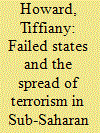

|
|
|
|
|
| Publication |
2010.
|
| Summary/Abstract |
Plagued by systematic state failure, sub-Saharan Africa's failed states have helped facilitate internationally sponsored terrorist networks and operations. However, until recently, this type of activity was primarily relegated to North Africa and the Horn. But that has begun to change. Now, what was once a seemingly benign terrorist presence in sub-Saharan Africa is starting to transform into a movement, with states such as Nigeria, Sierra Leone, Liberia, and the Democratic Republic of the Congo (DRC) now lending arms, financial support, and radical militants to the extremist jihadist movement of internationally sponsored terrorist organizations such as Al Qaeda. Further, with the recent bombings in Kenya and Somalia, and the failed bombing attempt on a U.S. airliner by a Nigerian national, it is becoming increasingly evident that internationally sponsored terrorist networks have found a permanent home in sub-Saharan Africa and within the hearts and minds of its people, which poses significant challenges for the international community, given the region's patchwork of failed states, where terrorists can easily hide and thrive. Consequently, this study discusses how the conditions of state failure have fostered support for internationally sponsored terrorism in sub-Saharan Africa. Terrorist groups are now actively recruiting more militants from within the region and popular support for extremist acts is on the rise in sub-Saharan Africa. Thus, the article argues sub-Saharan Africa will soon become the site for the next generation of terrorists, and the next wave of terrorist activity.
|
|
|
|
|
|
|
|
|
|
|
|
|
|
|
|
| 20 |
ID:
105038
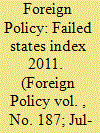

|
|
|
|
|
| Publication |
2011.
|
| Summary/Abstract |
The new edition of the index draws on some 130,000 publicly available sources to analyze 177 countries and rate them on 12 indicators of pressure on the state during the year 2010 -- from refugee flows to poverty, public services to security threats. Taken together, a country's performance on this battery of indicators tells us how stable -- or unstable -- it is. And the latest results show how much the 2008 economic crisis and its ripple effects everywhere, from collapsing trade to soaring food prices to stagnant investment, are still haunting the world.
|
|
|
|
|
|
|
|
|
|
|
|
|
|
|
|
|
|
|
|
|